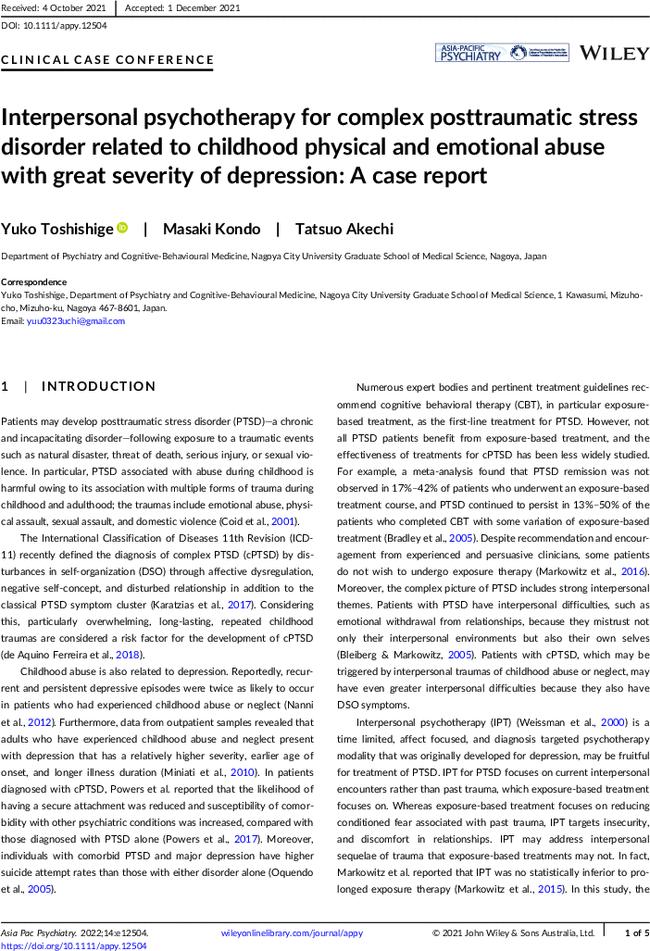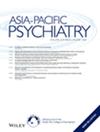Interpersonal psychotherapy for complex posttraumatic stress disorder related to childhood physical and emotional abuse with great severity of depression: A case report
IF 3.4
3区 医学
Q2 PSYCHIATRY
引用次数: 1
Abstract
Patients may develop posttraumatic stress disorder (PTSD)—a chronic and incapacitating disorder—following exposure to a traumatic events such as natural disaster, threat of death, serious injury, or sexual violence. In particular, PTSD associated with abuse during childhood is harmful owing to its association with multiple forms of trauma during childhood and adulthood; the traumas include emotional abuse, physical assault, sexual assault, and domestic violence (Coid et al., 2001). The International Classification of Diseases 11th Revision (ICD11) recently defined the diagnosis of complex PTSD (cPTSD) by disturbances in self-organization (DSO) through affective dysregulation, negative self-concept, and disturbed relationship in addition to the classical PTSD symptom cluster (Karatzias et al., 2017). Considering this, particularly overwhelming, long-lasting, repeated childhood traumas are considered a risk factor for the development of cPTSD (de Aquino Ferreira et al., 2018). Childhood abuse is also related to depression. Reportedly, recurrent and persistent depressive episodes were twice as likely to occur in patients who had experienced childhood abuse or neglect (Nanni et al., 2012). Furthermore, data from outpatient samples revealed that adults who have experienced childhood abuse and neglect present with depression that has a relatively higher severity, earlier age of onset, and longer illness duration (Miniati et al., 2010). In patients diagnosed with cPTSD, Powers et al. reported that the likelihood of having a secure attachment was reduced and susceptibility of comorbidity with other psychiatric conditions was increased, compared with those diagnosed with PTSD alone (Powers et al., 2017). Moreover, individuals with comorbid PTSD and major depression have higher suicide attempt rates than those with either disorder alone (Oquendo et al., 2005). Numerous expert bodies and pertinent treatment guidelines recommend cognitive behavioral therapy (CBT), in particular exposurebased treatment, as the first-line treatment for PTSD. However, not all PTSD patients benefit from exposure-based treatment, and the effectiveness of treatments for cPTSD has been less widely studied. For example, a meta-analysis found that PTSD remission was not observed in 17%–42% of patients who underwent an exposure-based treatment course, and PTSD continued to persist in 13%–50% of the patients who completed CBT with some variation of exposure-based treatment (Bradley et al., 2005). Despite recommendation and encouragement from experienced and persuasive clinicians, some patients do not wish to undergo exposure therapy (Markowitz et al., 2016). Moreover, the complex picture of PTSD includes strong interpersonal themes. Patients with PTSD have interpersonal difficulties, such as emotional withdrawal from relationships, because they mistrust not only their interpersonal environments but also their own selves (Bleiberg & Markowitz, 2005). Patients with cPTSD, which may be triggered by interpersonal traumas of childhood abuse or neglect, may have even greater interpersonal difficulties because they also have DSO symptoms. Interpersonal psychotherapy (IPT) (Weissman et al., 2000) is a time limited, affect focused, and diagnosis targeted psychotherapy modality that was originally developed for depression, may be fruitful for treatment of PTSD. IPT for PTSD focuses on current interpersonal encounters rather than past trauma, which exposure-based treatment focuses on. Whereas exposure-based treatment focuses on reducing conditioned fear associated with past trauma, IPT targets insecurity, and discomfort in relationships. IPT may address interpersonal sequelae of trauma that exposure-based treatments may not. In fact, Markowitz et al. reported that IPT was no statistically inferior to prolonged exposure therapy (Markowitz et al., 2015). In this study, the Received: 4 October 2021 Accepted: 1 December 2021

人际心理疗法治疗儿童期身心虐待伴重度抑郁症的复杂创伤后应激障碍1例
本文章由计算机程序翻译,如有差异,请以英文原文为准。
求助全文
约1分钟内获得全文
求助全文
来源期刊

Asia‐Pacific Psychiatry
PSYCHIATRY-
CiteScore
7.80
自引率
0.00%
发文量
17
审稿时长
>12 weeks
期刊介绍:
Asia-Pacific Psychiatry is an international psychiatric journal focused on the Asia and Pacific Rim region, and is the official journal of the Pacific Rim College of Psychiatrics. Asia-Pacific Psychiatry enables psychiatric and other mental health professionals in the region to share their research, education programs and clinical experience with a larger international readership. The journal offers a venue for high quality research for and from the region in the face of minimal international publication availability for authors concerned with the region. This includes findings highlighting the diversity in psychiatric behaviour, treatment and outcome related to social, ethnic, cultural and economic differences of the region. The journal publishes peer-reviewed articles and reviews, as well as clinically and educationally focused papers on regional best practices. Images, videos, a young psychiatrist''s corner, meeting reports, a journal club and contextual commentaries differentiate this journal from existing main stream psychiatry journals that are focused on other regions, or nationally focused within countries of Asia and the Pacific Rim.
 求助内容:
求助内容: 应助结果提醒方式:
应助结果提醒方式:


